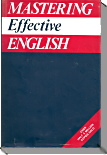

| Book of the Month | ||
 |
Mastering Effective English |  |
Publisher: Copp Clark Pitman
Author: -
$16.25
ISBN 0-7730-2305-4
These days English Language textbooks fall into two classes. There are the large-format books with lots of white space around big, colourful pictures and a couple of sentences containing explanationss and a few lines of practice exercises. Publishers like these books, because the colour pictures mean that they can charge more, and the lack of content means that students have to buy more of them to actually learn something. Then there are books packed solid with content, and full of detailed explanations. Publishers like these less, and they worry many students because there is so much to learn in each book. Mastering Effective English falls right into the second group. If fact, with over 700 fact-filled pages, if this heavy book falls anywhere, it can cause serious damage. Despite its weight, this is not a grammar book. The writers assume that the student knows the basics of English and has a reasonable vocabulary. As the title says, this book is about how to use those skills effectively.
The main twenty-six chapters of this book are in two parts - written and spoken English. Between them, they take a student through everything necessary to use English expertly. For example chapter two is entitled 'Correct and Clear Sentences'. This is subdivided into two parts 'Unity' and 'Coherence'. 'Unity' describes how a good sentence should be constructed - and also goes into considerable detail about how it should not be constructed. 'Coherence' describes things like subordinate clauses and sentence fragments. There are a few black-and-white cartoons scattered through the book. The section on coherence gives an example of a grammatical error 'Sitting in its cage, I saw the monkey scratch its head.' The cartoon shows a person sititng in a cage watching a monkey outside scratch its head, while a sign alongside says 'Please do not feed the dangling participle'. From sentences inchapter one, the next chapter describes paragraphs. Later chapters go on to different types of writing - for example how to write summaries, descriptions, explanations and business letters.
Part two starts with spoken English with chapters like 'Effective Diction' and 'Pleasing the ear'. (This last is actually known as 'euphony' but the book prefers to use non-technical language where it can.) The later chapters return to written English again with reports, reviews, and material of use to the advanced student, such as 'Preparing Research Reports' and 'Literary Appreciation and Criticism'. We also learn how to prepare an effective argument in a debate, and even how to understand aspects of poerty. The final sections of this very comprehensive book include a 'grammar review' which is itself more comprehensive than many complete textbooks, and an index. The final section on'Parlimentary Practice' might be useful for those studying constitutional law, but could have been omitted to lighten a book which weighs just over a kilogram.
Who is this book for? Any student who is reasonably confident with English grammar and vocabulary and wants a book to with which to learn how to use these expertly should get this book. Also anyone - native speaker or EFL student - who needs to write good essays and exams at college wold do well to read at least the later sections. However, it should be noted that this book is published in Toronto, Canada and very occasionally has usages which are different from standard British English.
Verdict: Very comprehensive on English usage, less good for grammar.
Assessment 9/10